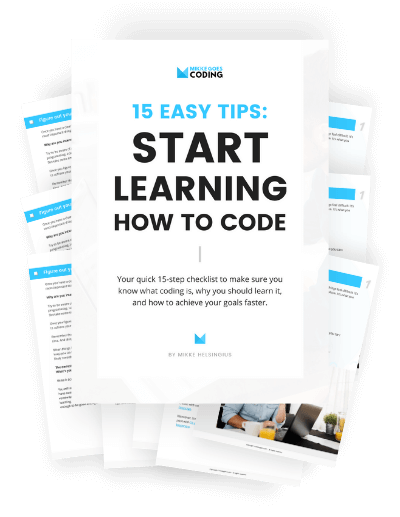Choosing your first programming language can be a difficult decision to make. You will spend a lot of time with it and it’s not always just a walk in the park along the way.
There are plenty of suitable languages for beginners with enough resources online alone for learning pretty much any language out there.
For me, Python was the first programming language I started learning. If you are not familiar, make sure you check out these top advantages of Python over other programming languages right now.
In this post, I will share a few reasons why Python was the right choice and why it’s a great programming language for absolute beginners.
Check out these related articles, too:
- What Programming Language Should You Learn? Beginner’s Guide
- 4 Easiest Programming Languages for Beginners
- 19 Best YouTube Channels to Learn Python Programming for Beginners
Please note: This post contains affiliate links to products I use and recommend. I may receive a small commission if you purchase through one of my links, at no additional cost to you. Thank you for your support!
What is Python?
Python was first released in 1991. So we’re not talking about something new in the market. However, Python’s experienced somewhat of a boom in the past years.
It’s is a high-level programming language, meaning it’s far from a machine language, making it easier for beginners to read and grasp.
Furthermore, being general-purpose programming language, Python is quite versatile for different sorts of projects.
Python is administered by the non-profit Python Software Foundation.
Are you just getting started with coding? Great! Check out my Free Coding Guide for Beginners for a kick-start into learning coding.
Why Python is the perfect first programming language
First off: everything you need for writing Python is free and available online! The language is open source and free to use for everyone, even for commercial projects and applications.
Basically you just need to install Python on your computer and pick a text editor to write your code. Then just use your Terminal to execute your programs or alternatively use the platforms offered by some text editors.
There are plenty of reasons why Python is well-suited for anyone just getting into programming. Let me point out that, since it was my first language, I might be a bit biased. You know, like moms are with their first children.
Anyways, I’ll be going through the following points in this post that make Python a great choice in my eyes:
- Clear, readable syntax
- Quick progression
- Versatility
- Widely available resources
- Supportive community
Let’s get started!

Reason #1:
Clear, readable syntax
One of the fundamental ideas behind Python is to facilitate writing easily readable, “clean” code.
Moreover, the code is easy to read since it somewhat resembles English. This makes it easier to type than some other languages, too.
Additionally, Python uses proper indentation as an additional, “forced” way of making the code clearer and more structured. At least in my eyes, that it.
For anyone writing and reading code in Python, this all helps spot the eventual errors and bugs in the code, too.
To further emphasise some Python fundamentals, here are a few points from the core philosophy of the language, “The Zen of Python“:
- Beautiful is better than ugly.
- Explicit is better than implicit.
- Simple is better than complex.
- Complex is better than complicated.
- Flat is better than nested.
- Sparse is better than dense.
- Readability counts.
To read the Zen in full, start your Python Shell and type the following and hit Enter:
>>>import this
Reason #2:
Quick progression
When you start learning Python, you will soon be writing small programs of your own.
Thanks to the clear and easy-to-learn syntax, you won’t be stuck with getting the hang of the basic dynamics of the language.
I found it extremely helpful for beginners that Python reads so much like English. For solving problems, you can write some “pseudo code” first, listing the procedures necessary to reach the goal and solve the problem.
After a few days of practice with Python, your pseudo code will magically start to resemble real Python code.
In other words, Python’s simple and clear syntax allows you to focus on creating solutions for your problems quickly.
This was one of the things that kept me so motivated while learning Python. It felt so empowering to build my own small programs so fast!
Read next: 10 Smart Tips to Learn Programming Faster
Reason #3:
Versatility
Since Python a general-purpose language, developers use it for a variety of different projects:
- Data science
- Machine learning
- Web development
- Game development etc,
For a beginner in programming, this versatility is awesome. Here’s why:
When you are new to programming, you may not have a very clear idea of what you want to build in the future.
But as you go through a few practical exercises, you will soon spot the ones you find most intriguing.
Furthermore, you will find it easy to tell whether a field you first were interested in really is your thing.
Another point worth mentioning is the wide collection of standard libraries and additional packages.
A library is like a collection of “books” that extend your program’s functionalities and help you solve specific tasks with Python. This makes it easier for even beginners to start working on practical projects early on.
To mention a few, take a look at these:
- Pygal, a data analysis and visualisation library for interactive SVG graphs
- matplotlib, a plotting library popular among data scientists and academic researchers
- Pygame for developing games
- Django, a framework for developing web apps, easy to learn, a great alternative to Ruby on Rails
Read next: Why I Started to Teach Myself to Code (And Why You Should Too)
Reason #4:
Widely available resources
Even if you are new to coding, it’s easy to get started with Python by taking an online course.
The WWW is packed with beginner-level programming tutorials, courses, forums, and other resources. But it can sometimes feel difficult to know where to start.
To help you out, here are my favourite resources for beginners to start learning Python:
- Codecademy:
This ultra-intuitive Python course is excellent for beginners to get the hang of the basic concepts of the language. Going through the exercises will quickly help you decide whether Python feels like the right language for you. - 30 Days of Python:
For an all-in-one starter kit for Python, check out this course on Udemy. Justin, your awesome instructor, takes great care of you while you learn how to create real-life Python projects step-by-step. - Python Crash Course:
This book is my absolute go-to! I got my hands on it when I first started with Python and it’s in my bookcase to stay. The author makes sure even complete beginners feel well-guided and not left alone at any point. You can get the book on Amazon right here. - Exercism:
Good exercises for practicing your newly acquired skills from Codecademy, for example. - Learn Python the Hard Way:
This book will make Python familiar to you in no time. It’s consistent, to the point, and it makes you go through the “boring” stuff too to understand the language better. Follow through and you’ll see results sooner than you thought. Here’s a direct link for getting your own copy on Amazon. - Introduction to Python Programming at Udacity:
A great course for anyone new to programming and Python. Suitable for intermediate students, too.

Reason #5:
Supportive community
When you start learning programming with Python, you will have questions. We all run into problems and roadblocks – that’s all part of the fun of learning to code.
So when that happens, you want to know there’s a supportive community out there to help you out.
Luckily, any question you may have, someone has already answered it online.
You can find help and answers to your Python questions here, for example:
- Python Documentation by the Python Software Foundation
- Python forums such as Python-Forum.io
- PyCon conferences, several times each year
- Django documentation for support with Django
You can also find plenty of discussion forums and platforms with Python threads. See the questions tagged with Python on Stack Overflow, for example.
Final thoughts: Why Python is a great first programming language
Python has plenty of nice perks for beginners. When you are considering which language to pick as your first programming language, give Python a go.
Looking back to how my journey with Python has been, I can’t believe how quickly I picked it up and was able to write small programs of my own.
About four weeks after I had initially started with Python, I already had my first web application up and running. It wasn’t too fancy, but I had to start somewhere, right?
Just remember: all that matters is that you start and keep going!
To find the best way to learn Python, check out this post with 20 of the best resources to learn Python with no experience.
When you’re ready to build your first small projects, here are some fun ideas for Python projects for beginners. Have fun!
Happy coding!
– Mikke



Python is a terrible first language to learn. Functions taking positional and named parameters with defaults? No clear scope of variables (think C)? OO, procedural and functional programming thrown together? **kwargs? Yuk!
Yes, it is popular. Not, it does not make it a good language, especially first language to learn!
Great points! You’re absolutely right – every language also comes with reasons why it’s not the perfect tool to learn. It really boils down to weighing out both the pros and cons, and being mindful of what you want to build and create with code in the future.
Cheers,
Mikke